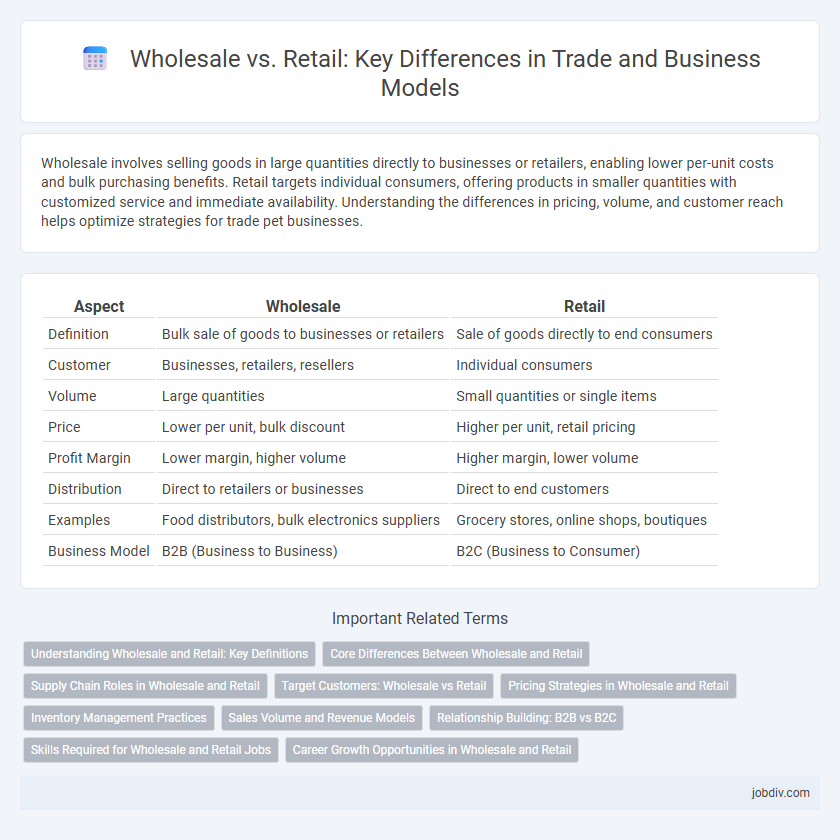Wholesale involves selling goods in large quantities directly to businesses or retailers, enabling lower per-unit costs and bulk purchasing benefits. Retail targets individual consumers, offering products in smaller quantities with customized service and immediate availability. Understanding the differences in pricing, volume, and customer reach helps optimize strategies for trade pet businesses.
Table of Comparison
| Aspect | Wholesale | Retail |
|---|---|---|
| Definition | Bulk sale of goods to businesses or retailers | Sale of goods directly to end consumers |
| Customer | Businesses, retailers, resellers | Individual consumers |
| Volume | Large quantities | Small quantities or single items |
| Price | Lower per unit, bulk discount | Higher per unit, retail pricing |
| Profit Margin | Lower margin, higher volume | Higher margin, lower volume |
| Distribution | Direct to retailers or businesses | Direct to end customers |
| Examples | Food distributors, bulk electronics suppliers | Grocery stores, online shops, boutiques |
| Business Model | B2B (Business to Business) | B2C (Business to Consumer) |
Understanding Wholesale and Retail: Key Definitions
Wholesale involves selling goods in large quantities typically to retailers or other businesses, enabling bulk purchasing at lower prices per unit. Retail refers to the sale of individual products directly to consumers, often at higher prices due to smaller purchase volumes and added service value. Understanding these key definitions clarifies the distinct roles each plays in the supply chain, impacting pricing strategies, inventory management, and customer targeting.
Core Differences Between Wholesale and Retail
Wholesale involves selling goods in large quantities primarily to retailers, businesses, or other wholesalers, focusing on bulk transactions and lower prices per unit. Retail centers on selling products directly to the end consumer in smaller quantities, often emphasizing customer experience and convenience. Key differences include target customers, transaction volume, pricing strategy, and supply chain roles.
Supply Chain Roles in Wholesale and Retail
Wholesale plays a crucial role in the supply chain by acting as an intermediary that purchases large quantities of goods from manufacturers and distributes them to retailers, ensuring product availability across multiple retail outlets. Retail focuses on the final stage of the supply chain, providing direct sales to consumers and emphasizing inventory management, customer service, and point-of-sale operations. Efficient coordination between wholesale and retail optimizes product flow, reduces lead times, and enhances overall supply chain responsiveness.
Target Customers: Wholesale vs Retail
Wholesale targets businesses, retailers, and large-scale buyers seeking bulk quantities at lower prices for resale or production purposes. Retail focuses on individual consumers purchasing smaller quantities for personal or household use, emphasizing convenience and variety. Understanding the distinct needs of these target customers enables businesses to tailor pricing, marketing, and service strategies effectively in the trade industry.
Pricing Strategies in Wholesale and Retail
Wholesale pricing strategies typically emphasize volume discounts and lower per-unit costs to attract bulk buyers and maintain long-term contracts, leveraging economies of scale. Retail pricing strategies prioritize competitive pricing, promotional discounts, and psychological pricing techniques to maximize consumer appeal and encourage frequent purchases. Understanding the distinct pricing approaches helps optimize profit margins and market positioning in both wholesale and retail trade channels.
Inventory Management Practices
Wholesale inventory management involves handling large quantities of products with a focus on bulk storage, efficient warehouse organization, and minimizing holding costs to enable high-volume sales. Retail inventory management emphasizes stock turnover, accurate demand forecasting, and maintaining optimal product variety to meet diverse consumer preferences while avoiding stockouts and overstock. Both practices require robust inventory tracking systems, but wholesalers prioritize bulk replenishment cycles while retailers focus on agile restocking based on sales patterns.
Sales Volume and Revenue Models
Wholesale sales volume typically involves large quantities of goods sold to retailers or other businesses, enabling lower per-unit prices and higher overall transaction values. Retail focuses on smaller, individual sales directly to consumers, often resulting in higher per-unit prices but lower sales volume compared to wholesale. Wholesale revenue models rely on bulk transactions with lower profit margins per item, while retail revenue models capitalize on markups and frequent sales to maximize profit.
Relationship Building: B2B vs B2C
Wholesale focuses on building long-term, trust-based relationships between businesses, often involving bulk transactions and negotiated contracts. Retail emphasizes personalized interactions with individual consumers, fostering loyalty through tailored experiences and frequent engagement. Both B2B and B2C relationship strategies prioritize understanding customer needs but differ in scale and communication style.
Skills Required for Wholesale and Retail Jobs
Wholesale jobs require strong negotiation skills, supply chain management expertise, and proficiency in market analysis to handle bulk transactions and maintain relationships with suppliers. Retail positions demand excellent customer service abilities, inventory management knowledge, and sales techniques to engage individual customers and drive point-of-sale performance. Both sectors benefit from effective communication and problem-solving skills, but wholesale emphasizes B2B interactions while retail focuses on direct consumer engagement.
Career Growth Opportunities in Wholesale and Retail
Wholesale careers often offer accelerated growth due to larger transaction volumes and business-to-business relationship management, which develop advanced negotiation and supply chain skills. Retail positions provide diverse opportunities to hone customer service expertise and frontline management, essential for ascending to store management or merchandising roles. Both sectors enable career progression, but wholesale typically emphasizes strategic and operational advancements, while retail focuses on customer-centric leadership development.
Wholesale vs Retail Infographic

 jobdiv.com
jobdiv.com